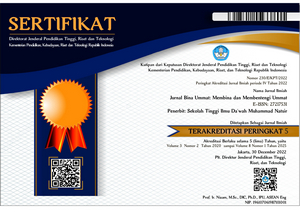The Influence of Social Cognition and Self Efficacy on Problem Solving Ability of Service Students at STID Mohammad Natsir
DOI:
https://doi.org/10.38214/jurnalbinaummatstidnatsir.v6i2.213Abstract
The purpose of this study to know how the influence of social cognition on problem-solving ability of service students at STID Mohammad Natsir; how the influence of self-efficacy of problem-solving ability in service students at STID Mohammad Natsir; and how the influence of social cognition and self-efficacy simultaneously on problem-solving ability of service students at STID Mohammad Natsir. This research used descriptive quantitative with survey design. The population and sample in this study are students of STID Mohammad Natsir who have served for two years in various regions in Indonesia. Data collection in this study using questionnaires. Analysis of validity test used the Pearson product moment while reliability test used Cronbach’s Alpha. Technique of data analysis used classical assumption tests (normality, linearity, multicollinearity) and multiple regression analysis (heteroscedasticity tests, partial hypothesis tests, simultaneous hypothesis tests, coefficient determination tests). The results of this study showed that social cognition had a significant influence on students' problem-solving abilities with a comparative score of t-count > t-table, 3.214 > 1.999, while the significance value was 0.02 < 0.05. The second finding, self-efficacy had a significant influence on students' problem-solving abilities with a comparative score of t-count > t-table, 4.343 > 1.999 with a significance value of 0.00 < 0.05. Further findings, simultaneously between the variables of social cognition and self-efficacy exerted a significant influence on problem-solving ability. It is showed by a calculated F-value greater than the F-table, score ratio is 42.469 > 3.15. Judging from the significance score 0.00 < 0.05 indicated social cognition and self-efficacy affect problem-solving ability. From the test results of the coefficient of determination with score of R-squared 0.578. So, it shows that social cognition and self-efficacy contribute simultaneously to problem-solving ability reaching 57.8%. The remaining 42.2% indicated a contribution from other variables that were not used in this study.
Published
Versions
- 2023-12-31 (2)
- 2023-12-31 (1)
Issue
Section
This work is licensed under a Lisensi Creative Commons Atribusi 4.0 Internasional.
Authors who publish with this journal agree to the following terms:
- Authors retain copyright and grant the journal right of first publication with the work simultaneously licensed under a Creative Commons Attribution License that allows others to share the work with an acknowledgment of the work's authorship and initial publication in this journal.
- Authors are able to enter into separate, additional contractual arrangements for the non-exclusive distribution of the journal's published version of the work (e.g., post it to an institutional repository or publish it in a book), with an acknowledgment of its initial publication in this journal.
- Authors are permitted and encouraged to post their work online (e.g., in institutional repositories or on their website) prior to and during the submission process, as it can lead to productive exchanges, as well as earlier and greater citation of published work (See The Effect of Open Access).




